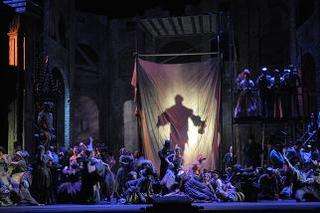|
Back
The artistic feast continues in Lyric Opera’s Faust Chicago
Lyric Opera of Chicago
10/05/2009 - & October 8, 11, 17, 20, 23, 30, November 3, 7*
Charles Gounod: Faust
Piotr Beczala/Joseph Kaiser* (Faust), Ana María Martínez (Marguerite), René Pape/Kyle Ketelsen* (Méphistophélès), Lucas Meachem (Valentin), Jane Bunnell (Marthe), Katherine Lerner (Siébel), Corey Crider (Wagner)
Orchestra and Chorus of the Lyric Opera of Chicago, Donald Nally (chorus master), Sir Andrew Davis (conductor)
Robert Perdziola (set/costume designer), Christine Binder (lighting designer), Frank Corsaro (director)

(© Dan Rest)
One of the pleasures in re-visiting productions is the opportunity to compare the opening night forces with those who bravely march into the breach later in the run. Lyric Opera’s revival of Gounod’s Faust, in the excellent Frank Corsaro production with visuals and lighting by Robert Perdziola and Christine Binder (previously reviewed by Paul Wooley) proved itself a veritable Golden Age feast upon its initial performance. Two of its primary elements, the title character himself as well as his diabolical nemesis, were taken in the second half of the run by a pair of American singers whose contribution pointedly demonstrated the quality of native talent on the international market today.
Lyric’s opening night Mephisto was the excellent German bass René Pape, whose splendid performance shrouded the role with deep-purple vocal velvet, and provided an imposingly dominant presence redolent of the grand manner. His replacement was Kyle Ketelsen, who has yet to achieve his colleague’s level of celebrity at home, though he has earned a passionate following overseas. In the spirit of honesty, it must be said that while Ketelsen commands an arrestingly beautiful bass instrument, he does not quite boast the sheer glamour of timbre as his predecessor, nor his impressive height, both obvious assets in this role. With no disrespect to the superb Herr Pape however, Mr. Ketelsen discovered a far greater wealth of nuance in Gounod’s alarmingly charming devil, and whatever price was paid in glitterati dazzle was amply compensated with an imaginatively conceptualized performance that ultimately rendered the production more effective by its presence. Ketelsen brought the physicality of a master dancer to the role, and captured its sardonic humor and dangerously sadistic allure as few have done. Some may ignore his performance given its juxtaposition with that of a more celebrated colleague; one suspects however, that if Ketelsen possessed some exotic French or Slavic name that nobody could pronounce, such comparisons would be entirely off the table.
Piotr Beczala made a glorious Chicago debut in the title role of this production, and his keen theatricality alloyed with one of the most beautiful, God-given tenor voices around is a hard act to match. Joseph Kaiser didn’t quite, and those for whom a Faust stands or falls on the strength of Salut! Demeure’s high C alone (opera fans can be frustratingly myopic in that way) may not have been convinced. Kaiser is no slouch though, to which his rapidly burgeoning international career attests. The duets with the Marguerite of Ana María Martínez were particularly beautiful, and his lead into the third act quartet was ravishing; his was a performance that reminded us how rich in fine lyric tenor voices we are today.
I must respectfully disagree with my estimable colleague Mr. Wooley where Martínez herself is concerned, as I consider her Marguerite among the very best one is likely to encounter today. The soprano’s timbre is dark and fragrant as Latin coffee laced with thick, luxuriant cream, and some may prefer a brighter, more forward sound in French repertory. But this is one gorgeous voice, loaded with dynamics, and capable of all the fluidity required by the display writing as well as the requisite dramatic weight of the later acts. Martínez also made some very strong interpretive choices in a role that can often register two-dimensionally; her very mad Marguerite in the prison scene rendered the denouement as understandable where we are too often given a placidly pallid figure that leaves one wondering what justifies all the angst, or how the pivotal infanticide occurred.
Lucas Meachem delivered a terrific Valentin. Opening night found him displaying a singular beauty of tone at the top of the range that rather attenuated below, but here the scale was all of a piece and beautifully produced, and he delivered a thrilling curse. The physical vitality of the death was admittedly a trifle jarring; presumably the goal was to present a vainglorious defiance of mortality (think Mercutio in Romeo and Juliet) but, well, this is opera after all.
Katherine Lerner fielded an attractively sung and cleverly characterized Siébel, and Cory Crider was an appealing and potently masculine Wagner. Jane Bunnell’s overripe Marthe was an absolute stitch, and graced by a purity of vocalism the character rarely receives.
Corsaro’s direction remains imaginative and specifically straightforward. The entrance of the devil as one of a number of shrouded corpses in Faust’s lab still sends a chill down the spine. One might question the final tableaux - the infernal contract bursts into flame, suggesting that Faust, like his victim, is ultimately redeemed - but it was visually effective. Perdziola’s physical production gracefully moves the action to the time of the opera’s composition, and his Victorian costumes, set before his imposing edifices of blue-grey stone, are stunning. Binder’s lighting was most evocative, especially when Méphistophélès conjured an expanse of twinkling stars to enhance the seductive ambiance of the Garden scene.
Donald Nally’s chorus experienced a few bumps and starts in their initial transition from former director Donald Palumbo’s leadership, but they have certainly hit their stride in 2009; C’est une croix was stunning. Andrew Davis had a field day with the score’s lush orchestral textures, and his propulsive reading prodigiously framed what was one of the most artistically satisfying Fausts in memory.
Mark Thomas Ketterson
|